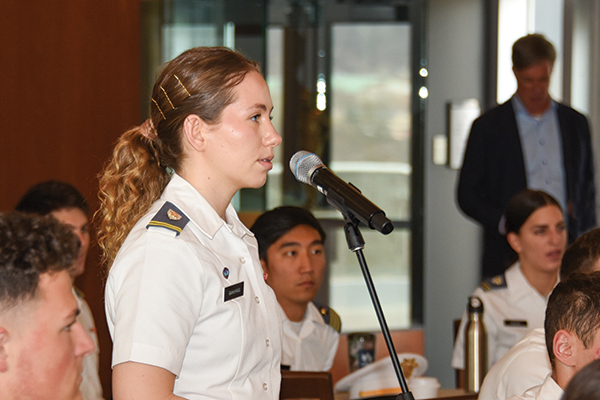By COL Sean Morrow ’01, Ph.D., Guest Writer
The Combating Terrorism Center at West Point (CTC) has been featured in the pages of West Point magazine before; however, those articles came at a time when counterterrorism played a central role in national security and in the lives of graduates.
The cadets who entered West Point this summer were born after September 11, 2001. In fact, those grads who entered West Point in the late 1990s are chronologically closer to the Vietnam War than the current new cadets are to September 11, 2001.
Over the last 20 years, the actions of the United States’ national security apparatus and that of its allies successfully reduced capabilities, destroyed infrastructure, eliminated threats, and generally degraded and disrupted terrorist organizations. General Joe Votel ’80 (Retired), the CTC Distinguished Chair, and many other West Point graduates were instrumental in the strategic, operational, and tactical battlefield victories that diminished the organizational capabilities of the ISIS caliphate and maintained the pressure on Al Qaeda and other violent extremist organizations. Those successes enabled the United States to adjust its national security priorities to refocus on the pacing threat of China, the Russian aggression in Eastern Europe, and the nuclear threats from North Korea and Iran. Strategic competition, not counterterrorism, is the centerpiece of the United States’ current National Security Strategy.
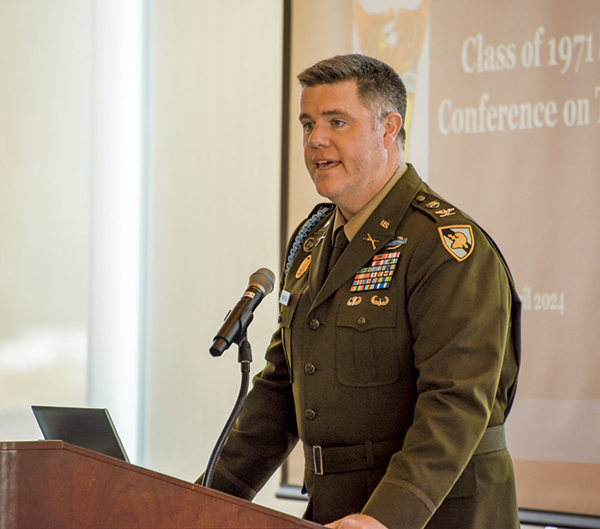
Over the last year, however, terrorism has been thrust back into the spotlight. The October 7th terrorist attacks on Israel, the terrorist attack in Moscow, and the continued disruption of and attacks upon commercial and military vessels by the Houthis have demonstrated that, while disrupted, terrorism remains a threat to people, states, and commercial entities around the world. Terrorism takes lives, destroys infrastructure, and has the potential to distract the Army and nation from greater national security threats. Although the last 20 years have seen counterterrorism at the fore, CTC was actually built for this moment—to continue focusing on the threat when it’s no longer making headlines.
CTC was created through the vision, leadership and generosity of Mr. Vinnie and Teresa Viola ’77, General Wayne Downing ’62, and Brigadier General Russ Howard. Throughout its history, CTC has inspired cadets to think deeply about the complexity of terrorism and counterterrorism while also following the guidance of Lieutenant General Steve Gilland ’90, USMA Superintendent, and Brigadier General Shane Reeves ’96, USMA Dean, to serve as a steadfast source of intellectual capital to the Army and the United States national security community. Embedded in the Department of Social Sciences, CTC sits at the nexus of scholarship, policy, and operations in counterterrorism. Its threefold mission to educate, advise and conduct research was devised to inspire and equip current and future leaders in the counterterrorism fight with the tools necessary to detect, deter, disrupt and defeat individuals and organizations that seek to harm the nation and its citizens. As the threat evolves, so does CTC across its various lines of effort.
EDUCATE:
Dr. Richard Yon, the Class of 1977 Director of Terrorism Studies, leads the Terrorism Studies (TS) minor. The TS minor is one of the most popular minors at West Point, with approximately 25 to 30 cadets joining the program each year and dozens more choosing to take its courses as electives. Cadets in SS465: Terrorism-New Challenges study the history of terrorism and the goals, strategies and tactics of threat organizations. SS466 introduces cadets to the many ways counterterrorism is conducted. Although targeting, intelligence, and law enforcement actions are critical, cadets are increasingly learning about the roles of information operations as well as the role of counter-threat finance. Finally, cadets in the TS minor take a course in homeland security policy and learn how the instruments of government work together to detect, deter, and defeat threats to the homeland.
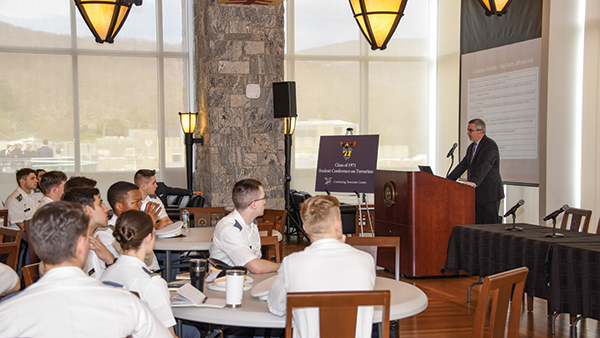
Cadet learning is also enhance by the Elizabeth Anne Gilmore AIAD (named for the mother of George Gilmore ’71), which is provided through Margin of Excellence funding. CTC cadets serve summer apprenticeships with joint terrorism task forces around the country and in billets at U.S. Special Operations Command (SOCOM), Joint Special Operations Command (JSOC), and U.S. Army Special Operations Command (USASOC).
Through it all, the cadets are exposed to a world-class education from the CTC faculty and from the array of senior fellows who generously partner with the West Point Association of Graduates to give their time and wisdom to the TS Program: General Scott Miller ’83 serves as the Class of 1987 Senior Fellow, while the Honorable Juan Zarate (formerly the first ever Assistant Secretary of the Treasury for Terrorist Financing) joins CTC as the Class of 1971 Senior Fellow. Two former leaders at the CIA, the FDNY Deputy Commissioner and Chief who was in the South Tower on September 11th, and Dr. Bruce Hoffman (George H. Gilmore Senior Fellow) round out the leaders who inspire cadets every semester.
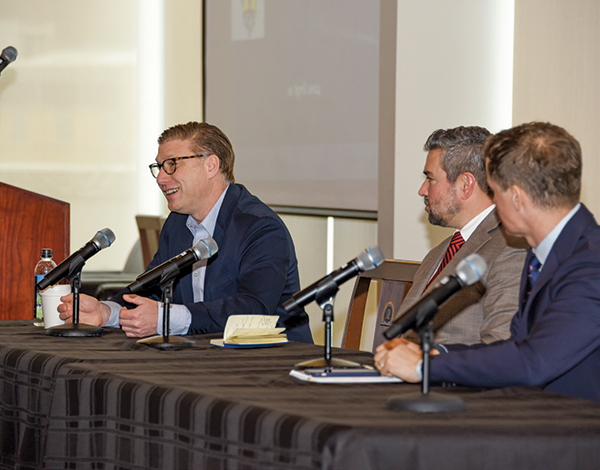
Cadets also have tremendous access to current leaders through the Class of 1971 Student Conference on Terrorism and the Class of 1971 Distinguished Lecture. Recent programs have included the Commander of the Army Special Mission Unit (Delta Force), the Commander of the 75th Ranger Regiment, and the next Commander of the British Special Air Service. The 2024 Student Conference, held in April, partnered with the Defense Intelligence Agency (DIA) to welcome senior leaders from the CIA, the Department of Homeland Security, and academia. Cadets spent the morning learning from these leaders and then used the afternoon to conduct practical exercises on the roles of technology, interagency partnerships, and alliances, discovering how these variables can increase the United States’ capabilities in the fight against terrorism. The General Wayne Downing Scholarship Program is another way CTC prepares leaders for the fight against terrorism. Each year, eight talented officers are selected to pursue a graduate degree at one of the world’s top universities. Over the course of two years, the fellows have a robust development experience that focuses on leadership, technology, and policy. Recent engagements for the scholars have been with Lieutenant General Jon Braga ’91, USASOC Commanding General; H.R. McMaster ’84, National Security Advisor; General Jim Mattis (Retired), former Secretary of Defense; Condoleezza Rice, former Secretary of State; and Dr. Joe Felter ’87, Deputy Assistant Secretary of Defense for South Asia, as well as with leaders from Stanford, MIT Lincoln Laboratory, the FBI, and multiple corporations in the national security space. The Downing Scholars summer experience, often abroad and focused on real world research and global integration, helps prepare the fellows to return to the Army with the tools necessary to fight and win in the counterterrorism space and with skills that translate to what the nation needs, when the nation needs it. The Downing Scholar alumni network is nearly 100 strong and has leaders in critical Army billets around the world.
ADVISE:
The greatest value CTC can bring to its cadets and other government agencies is access to its trusted network. CTC’s long history with the FDNY includes West Point leaders running the annual FDNY Counterterrorism Course. Furthermore, by continually working with and for the Department of State, the U.S. Agency for International Development, USASOC, SOCOM, the DIA, and other United States government agencies, CTC ensures that the work the center does, and the work the cadets are exposed to, is relevant and current. These partnerships are only possible because of generous support from the USMA classes of ’66, ’71, ’77, ’87, and ’01.
RESEARCH:
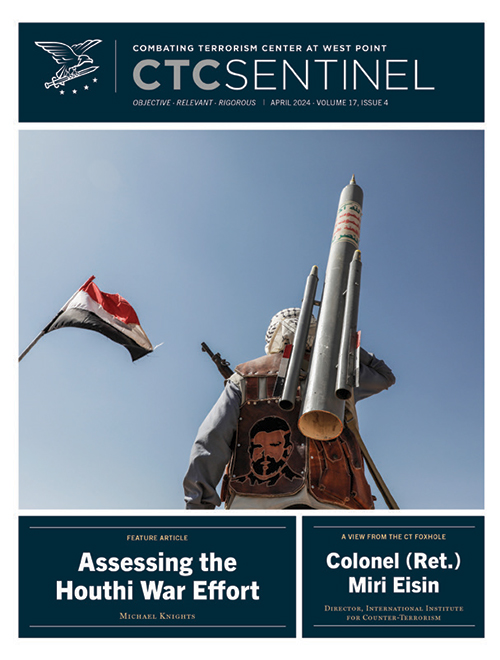
The CTC Sentinel is a monthly journal sent to approximately 18,000 online subscribers. It is regarded by many experts as the top publication in the counterterrorism field, renowned for its relevance and timeliness. During the last year, Sentinel articles have been featured in or referenced by the BBC, the New York Times, and CNN, as well as in the French Parliament and in United States congressional hearings. Notably, allies and scholars are not the only ones reading it. Former Al Qaeda leader Ayman Al Zawahiri routinely referenced (and critiqued!) Sentinel articles in his propaganda. When JSOC operators came off the Bin Laden compound after the 2011 raid, they found multiple CTC products among Bin Laden’s papers and a note from Bin Laden to his staff demanding that he receive anything produced by “CTC West Point.” The Sentinel is committed to having innovative conversations about terrorism, using rigorous and relevant research supported by data. The journal seeks to be future focused and aims to stimulate the imagination of readers who study and prosecute terrorist organizations.
While the Sentinel is the primary research outlet for the CTC’s work, the center also produces independent reports, convenes panels and conference proceedings, supports various podcasts, and responds to needs from the United States government.
Although terrorism is not currently at the heart of the United States’ National Security Strategy, it remains an enduring threat and a critical fight. The ability of one successful attack to harm U.S. citizens and damage vital infrastructure could potentially divert resources and attention from greater threats to national security. Thanks to the CTC at West Point, the U.S. government is ready and prepared to prevent those fights. CTC will also continue to support this fight by preparing the next generation of leaders to think critically about these problems and by doing the work that supports that nation’s warfighters, its intelligence professionals, and its policymakers.
When CTC was founded in 2003, it was a small enterprise with a vision to inspire cadets to think about the complex terrorism problem and with a mission to support practitioners and policymakers in their effort to ensure the safety of the nation and its citizens. Through the efforts of our cadets, the support of our Long Gray Line, the team at the West Point Association of Graduates, and the commitment of a dedicated faculty, CTC has built a global reputation as a trusted source of knowledge and understanding. CTC will continue to serve as a steward of those resources and will ensure that our cadets are prepared to be curious, creative, and innovative thinkers in the ongoing fight against terrorism. Beat ISIS!
COL Sean Morrow ’01, Ph.D., is the Director of the Combating Terrorism Center at West Point. Commissioned as an Infantry officer, Morrow has served around the world, including Iraq, Afghanistan, and the Demilitarized Zone, where he commanded the United Nations Command Security Battalion (the JSA). He holds an M.A. from Boston College and a Ph.D. from the University of Chicago.
Read or subscribe to the CTC Sentinel here.
FAQ for West Point Combating Terrorism Center
1. What is the Combating Terrorism Center (CTC) at West Point?
- The CTC is a research and educational institution focused on terrorism and counterterrorism. It educates cadets and conducts research to support U.S. security efforts.
2. What programs does CTC offer to cadets?
- CTC offers a Terrorism Studies minor, special courses like SS465 and SS466, and provides summer AIAD at agencies such as SOCOM and JSOC.
3. What is CTC’s mission?
- The CTC’s mission is to educate, advise, and conduct research on terrorism, helping to prepare future leaders to counter these threats.
4. Who leads the CTC?
- The CTC is led by COL Sean Morrow and supported by expert faculty and senior fellows from the government and academic sectors.
What do you think? Click here to answer four questions.

